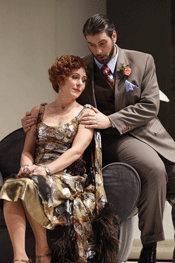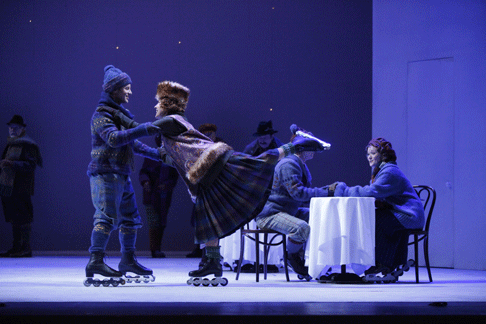![Mary Dunleavy as Christine Storch [Photo by Carol Rosegg courtesy of New York City Opera]](http://www.operatoday.com/Intermezzo0031.gif)
07 Nov 2010
Intermezzo, New York City Opera
Pace Tolstoy, happy marriages are not all alike, but they require a lot of work.
English Touring Opera are delighted to announce a season of lyric monodramas to tour nationally from October to December. The season features music for solo singer and piano by Argento, Britten, Tippett and Shostakovich with a bold and inventive approach to making opera during social distancing.
This tenth of ten Live from London concerts was in fact a recorded live performance from California. It was no less enjoyable for that, and it was also uplifting to learn that this wasn’t in fact the ‘last’ LfL event that we will be able to enjoy, courtesy of VOCES8 and their fellow vocal ensembles (more below …).
Ever since Wigmore Hall announced their superb series of autumn concerts, all streamed live and available free of charge, I’d been looking forward to this song recital by Ian Bostridge and Imogen Cooper.
Although Stile Antico’s programme article for their Live from London recital introduced their selection from the many treasures of the English Renaissance in the context of the theological debates and upheavals of the Tudor and Elizabethan years, their performance was more evocative of private chamber music than of public liturgy.
Evidently, face masks don’t stifle appreciative “Bravo!”s. And, reducing audience numbers doesn’t lower the volume of such acclamations. For, the audience at Wigmore Hall gave soprano Elizabeth Llewellyn and pianist Simon Lepper a greatly deserved warm reception and hearty response following this lunchtime recital of late-Romantic song.
For this week’s Live from London vocal recital we moved from the home of VOCES8, St Anne and St Agnes in the City of London, to Kings Place, where The Sixteen - who have been associate artists at the venue for some time - presented a programme of music and words bound together by the theme of ‘reflection’.
'Such is your divine Disposation that both you excellently understand, and royally entertaine the Exercise of Musicke.’
‘And there was war in heaven: Michael and his angels fought against the dragon; and the dragon fought and his angels, And prevailed not; neither was their place found any more in heaven … that old serpent … Satan, which deceiveth the whole world: he was cast out into the earth, and his angels were cast out with him.’
There was never any doubt that the fifth of the twelve Met Stars Live in Concert broadcasts was going to be a palpably intense and vivid event, as well as a musically stunning and theatrically enervating experience.
‘Love’ was the theme for this Live from London performance by Apollo5. Given the complexity and diversity of that human emotion, and Apollo5’s reputation for versatility and diverse repertoire, ranging from Renaissance choral music to jazz, from contemporary classical works to popular song, it was no surprise that their programme spanned 500 years and several musical styles.
The Academy of St Martin in the Fields have titled their autumn series of eight concerts - which are taking place at 5pm and 7.30pm on two Saturdays each month at their home venue in Trafalgar Square, and being filmed for streaming the following Thursday - ‘re:connect’.
The London Symphony Orchestra opened their Autumn 2020 season with a homage to Oliver Knussen, who died at the age of 66 in July 2018. The programme traced a national musical lineage through the twentieth century, from Britten to Knussen, on to Mark-Anthony Turnage, and entwining the LSO and Rattle too.
With the Live from London digital vocal festival entering the second half of the series, the festival’s host, VOCES8, returned to their home at St Annes and St Agnes in the City of London to present a sequence of ‘Choral Dances’ - vocal music inspired by dance, embracing diverse genres from the Renaissance madrigal to swing jazz.
Just a few unison string wriggles from the opening of Mozart’s overture to Le nozze di Figaro are enough to make any opera-lover perch on the edge of their seat, in excited anticipation of the drama in music to come, so there could be no other curtain-raiser for this Gala Concert at the Royal Opera House, the latest instalment from ‘their House’ to ‘our houses’.
"Before the ending of the day, creator of all things, we pray that, with your accustomed mercy, you may watch over us."
The doors at The Metropolitan Opera will not open to live audiences until 2021 at the earliest, and the likelihood of normal operatic life resuming in cities around the world looks but a distant dream at present. But, while we may not be invited from our homes into the opera house for some time yet, with its free daily screenings of past productions and its pay-per-view Met Stars Live in Concert series, the Met continues to bring opera into our homes.
Music-making at this year’s Grange Festival Opera may have fallen silent in June and July, but the country house and extensive grounds of The Grange provided an ideal setting for a weekend of twelve specially conceived ‘promenade’ performances encompassing music and dance.
There’s a “slide of harmony” and “all the bones leave your body at that moment and you collapse to the floor, it’s so extraordinary.”
“Music for a while, shall all your cares beguile.”
The hum of bees rising from myriad scented blooms; gentle strains of birdsong; the cheerful chatter of picnickers beside a still lake; decorous thwacks of leather on willow; song and music floating through the warm evening air.
![Mary Dunleavy as Christine Storch [Photo by Carol Rosegg courtesy of New York City Opera]](http://www.operatoday.com/Intermezzo0031.gif)
Pace Tolstoy, happy marriages are not all alike, but they require a lot of work.
I am not referring to the hectic happy marriage of Richard and Pauline Strauss, the model on which Strauss constructed Intermezzo, his portrait of the composer at home with the non-stop assault of his termagant wife accusing and blaming and admitting she’d find it dull to live with someone who didn’t fight back. I’m referring to the supremely happy marriage of artist and role (which, like any happy marriage, calls for luck and hard work) now on offer at the New York City Opera, where Mary Dunleavy has taken on the shrewish coloratura flights and turn-on-a-dime changes of mood that are Christine Storch.
Dunleavy’s honeyed voice resembles that of Renée Fleming before that grande dame became so affected and spoiled. I first heard Dunleavy’s sturdy lyric soprano as that roughest of dramatic coloratura workouts, Konstanze in Mozart’s Seraglio, and a woman who can handle Konstanze with credit can probably wrestle tigers. More recently she has been an admired Violetta (which I did not see). I wouldn’t have thought of Christine as a Dunleavy vehicle, perhaps because the part was created for the more opulent vocal charms of Lotte Lehmann, perhaps because the last time the City Opera presented it, the role was taken by Lauren Flanigan. Flanigan’s lyric skills were severely tested by the Strauss orchestra but her voice has a dangerous edge to it that made her an exciting Christine.
 Mary Dunleavy as Christine Storch and Nicholas Pallesen as Robert Storch
Mary Dunleavy as Christine Storch and Nicholas Pallesen as Robert Storch
Dunleavy lacks that edge, but her girlish qualities are stronger than they
seem (as was probably also true of Pauline Strauss, for whom her husband wrote
so many of his loveliest songs), and she has no problem riding the full blast
of a lush orchestra. At moments of stress, a metallic sheen (very Strauss, very
Jugendstil, like the gold slathered on a Klimt portrait) gleams through the
instrumental texture, which argues not merely ability but craft: Dunleavy knows
just how to slice through a heavy orchestra without putting herself under undue
strain. Nor did it hurt that, with her marcelled hair and suave twenties
costumes, her pert, imperious manner recalled the slangy heroines played by
Myrna Loy and Jean Arthur. Add to this a balletic figure and a charm that
almost persuades you Christine would be endurable, and you have the finest
achievement of a singing actress on New York’s opera stages this fall.
Intermezzo is one of Strauss’s conversational operas—the Prologue to Ariadne and Die Schweigsame Frau are similar—in that, though the score is full of melody, the voice seldom flows into easy, relaxing song. This is a major reason for the opera’s rarity in non-German-speaking lands, but with Dunleavy’s lyricism joining the fragments of sprechstimme and endearment and tirade, I felt as I do with a good Handel or Verdi recitativo accompagnato, that this was more interesting, more full of character, than song would be. Strauss uses the same richly symphonic language for the mythic and grandiose (in operas like Die Frau ohne Schatten and the “operatic” portions of Ariadne auf Naxos) as he does for the day-to-day domesticity of the “Sinfonia Domestica” and Intermezzo. Perhaps he saw no difference between the mythic and day-to-day family discord. Today, with a flood of new operas loosed upon the world dealing with messy everyday lives, neglecting antique myth or historical pageant, perhaps Intermezzo will prove to have been a harbinger of a change in operatic style, just as Strauss’s Elektra was a harbinger of new musical looks at classical Greece.
 Mary Dunleavy as Christine Storch and Andrew Bidlack as Baron Lummer
Mary Dunleavy as Christine Storch and Andrew Bidlack as Baron Lummer
The other triumph, musically speaking, was the lush Strauss score as led by George Manahan, which swept the evening’s welter of events along like the ice skater’s waltz mimed (on in-line skates) in one of Intermezzo’s many locales without drowning the singers. Vocally, the entire cast seemed well chosen and on their toes, as Pauline Strauss (a terror to her housemaids) would no doubt have imperiously insisted. Nicholas Pallesen sang the not quite credible saintly Robert Storch—Strauss’s self-portrait—with suave dignity, though some stretching for high notes implied that he might not have handled a full-sized leading role so easily. Andrew Bidlack as the young parasitical baron that snobby Christine unwarily picks up showed a fine, easy lyric tenor one hopes to hear more of. Jessica Klein was a pleasure as the most put-upon of the maids. A debutante named Tharanga Goonetilleke gave the three lines of the Baron’s girlfriend a deep, sexy contralto throb that made everyone’s ears open wider.
The handsome, stage-smart production was by Leon Major. Andrew Jackness’s sets and Martha Mann’s costumes looked handsome and in period (which is early, respectable Weimar) without evidently straining the budget.
John Yohalem